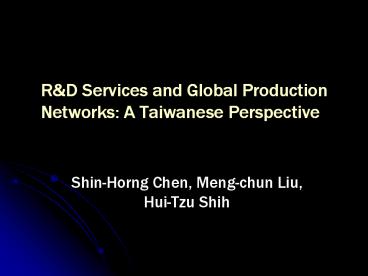R - PowerPoint PPT Presentation
1 / 15
Title: R
1
RD Services and Global Production Networks A
Taiwanese Perspective
- Shin-Horng Chen, Meng-chun Liu, Hui-Tzu Shih
2
1. Introduction
- IT manufacturing is often considered to be high
value-added, but this can be misleading, given
the sectors vulnerability to sharp declines in
price and narrowing profit margins. This can be
particularly significant in light of the
formation of global production networks. Hence,
manufacturing muscle alone may no longer be
deemed a sustainable comparative advantage. Such
a perspective highlights the importance of
intangible assets and their role in the
knowledge-intensification of industry. - The current paper examines the role of RD
services in the global production network in an
international context. As a starting point, it
is worth noting that, with only a few exceptions,
the relevant literature remains country-centric
despite the trend of RD internationalization.
3
- We explore, from Taiwans perspective, RD
network relationships in conjunction with the
global production network. Our specific focus is
on the international aspects of Taiwans national
innovation system. We aim to determine in what
ways and to what extent the RD facilities of
MNCs in Taiwan and the overseas RD of
Taiwan-based firms interact with Taiwans
indigenous innovation capabilities in the
broadly-defined IT industry. What do they mean
to the global production network? - The paper draws on two of our earlier research
projects. The first concerns the RD efforts of
MNCs in Taiwan and the second addresses the RD
deployment, within China, of Taiwan-based firms.
China is significant to this study because it has
become the major host country for outward
investment by Taiwanese IT firms. We argue that
driven by the emergence of the global production
network, RD services have become essential to
Taiwans economic development, which means more
than simply local RD and innovation
capabilities, but also the ability to leverage
international RD networks.
4
2. RD Globalization and the Developing World
- Technology and RD are becoming increasingly
globalized, bringing about the restructuring of
the global innovation system and the global
technology landscape. - MNCs RD operations in the developing world are
on the rise. MNCs face an increasing need to
monitor and learn the new global trends and hence
to engage in multi-sourcing of technology inputs,
because of rising RD costs, increasing demand
for RD personnel, and a shortage of RD
personnel in industrialized countries.
Conversely, some developing countries have an
abundant supply of RD personnel or skills,
particularly in non-core RD areas. This match
of supply and demand has been facilitated by
factors such as improved information and
communication technologies, the flexibility of
new technologies which allows de-linking of
manufacturing and RD, and the comparative
advantages of developing host countries. - For Taiwan, the essence of RD globalization
relates to such issues as how to tap and leverage
the international knowledge pool.
5
- Our conceptual framework is based on Dunnings
eclectic paradigm, with a strong flavor of the
evolutionary approach to technology, while in
some cases, allowing leap-frogging competition. - Dunnings paradigm can be useful for analyzing
the offshore RD activities of MNCs if one
interprets ownership, internalization, and
locational advantages in the context of RD, with
these advantages being related mainly to the
technological routines and trajectories of the
firms and the host economies. - The essence of our framework is that RD
globalization may be better understood in a
multilateral, rather than simply a bilateral,
context. This implies that RD undertaken by
three parties in separate locations may, to some
extent, interact, resulting in complicated
networking relationships.
6
Figure 1 RD-related advantages of MNCs,
Taiwan, and China in the context of Dunnings
eclectic paradigm
7
3. RD Undertaken by MNCs in Taiwan
- According to panel data, the estimated RD
intensity of foreign-owned subsidiaries in Taiwan
was 1.94 for the period 1996-1998, while the
intensity level of the electronics and electrical
appliances industry was 2.36. - By using Tobit regression analysis, we are able
to show that foreign-owned subsidiaries with
higher RD intensity have a higher export
propensity and a higher degree of localization in
terms of sourcing both production materials and
capital goods. This may suggest that Taiwan has
a first-tier supplier advantage for attracting
offshore RD for MNCs.
8
Figure 2 The Highest Level of RD Activity
Conducted by MNCs in Taiwan
Source Liu, Chen, and Lin (2002)
9
Figure 3 Taiwans strengths in RD operations
according to MNCs with operations in Taiwan
10
Figure 4 Taiwans weaknesses in RD operations
according to MNCs with operations in Taiwan
11
4. Taiwan-based Firms Cross-Strait RD Deployment
- A new phase of cross-strait industrial
interaction began recently. The emerging
geographical concentration of investment in
Chinas Long River Delta by Taiwan-based firms
suggests that Taiwanese outward investment to
China is becoming more technology- and
capital-intensive. - The China operations of Taiwan-based firms have
gone beyond manufacturing, increasingly moving
into RD. In a separate research project, we
found that 47.56 of respondents had conducted
RD activities in China. In other words, China
had become the major target for these Taiwanese
firms offshore RD in quantitative, though not
necessarily qualitative, terms.
12
Table 3 Cross-Strait RD deployment by
Taiwan-based firms
13
Technology sources of Taiwanese IT firms
subsidiaries in China
14
Relative significance of cross-strait RD by
Taiwans electronics firms
Indifferent
Highly important (Taiwan)
Highly important (China)
15
Cross-border production network
in the PC hardware industry
Product concept initiation
Prototype process design
Key Components parts
Process verification
Components parts
Sales services
Product RD
Procurement
Brands
Logistics
Assembly































